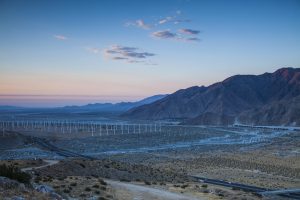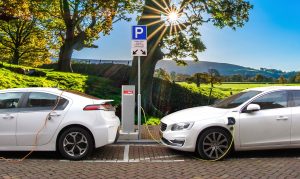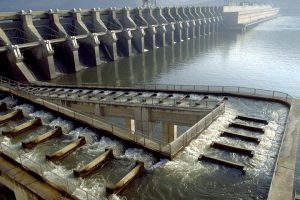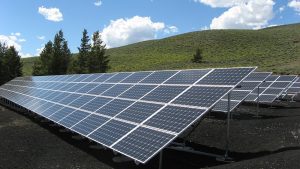587 item(s) were returned.
California is the second state after Hawaii to establish a 100% carbon-free energy goal for its electric grid. In late August, the state legislature passed Senate Bill 100 (SB 100) which created a 100% clean electricity standard by 2045 and also altered California’s current renewable portfolio standard (RPS). Previously, California’s RPS mandated 50% of the state’s retail electricity sales come from renewable sources by 2030, but following passage of SB 100, that figure is now modified to 60%. To achieve the 2045 goal, however, SB 100 takes a broader approach by explicitly instructing California’s energy agencies to “plan for 100%… [more]
View InsightExecutive Vice President
National Taxpayers Union
Republicans rightly criticized the $500 million loan guarantee to failed solar energy company Solyndra under the Obama administration, but now the current administration is preparing energy company bailouts that will dwarf the size of that mistake. If this bailout goes forward, taxpayers will be on the hook for billions of dollars for failing coal and nuclear power plants. The Solyndra failure was a textbook example of the pitfalls that exist when the federal government tries to pick winners and losers in the energy industry. The Trump administration seems to not have learned the lesson, as a number of financially troubled… [more]
View InsightPresident & Chief Executive Officer
NextEnergy
NextEnergy works with innovators to accelerate smarter, cleaner, more accessible solutions for communities and cities with a focus on smart mobility and smart buildings, homes, and infrastructure. When we think of smarter and cleaner, we typically think of technologies or solutions which are more integrated, connected, and more efficient. Integrating electric vehicles, buildings, and the grid will also improve our lifestyles, energy use, and environmental footprint. For example, in commercial buildings, more efficient networked lighting that saves energy for both the building owner and utility, can also create a better or more pleasing user experience. With transportation, electric vehicles can… [more]
View InsightChairman of the Energy and Commerce Subcommittee on Energy
U.S. House of Representatives
Whether it’s the flip of a light switch or plugging in your cell phone to charge – never has the reliability of our energy supply been more important to so much in our daily lives. That also means never has energy infrastructure been a greater potential target for an attack or energy security been as important. It is indisputable that ensuring the reliable and uninterrupted supply of fuels and electricity is absolutely essential to our nation’s economy, security, and the health and safety of its citizens. However, as our energy infrastructure has become more complex and society has grown more… [more]
View InsightDirector, Market Development & Business Affairs
Whooshh Innovations
Several years ago, the Department of Energy (DOE) issued a report on the energy potential of the thousands of non-powered dams in the US. With a significant number of untapped sources readily available, it makes sense to consider how we can utilize more of this emissions-free resource by “unleashing hydropower”. Many companies have attempted to shepard one of the more than 80,000 non-powered dams through the hydropower licensing process at the Federal Energy Regulatory Commission (FERC) only to find that unanticipated obstacles can arise like the requirement for fish passage. Often, FERC imposes a condition on the issuance of a… [more]
View InsightDirector of Strategic Research
Energy Futures Initiative
Quote: Blockchain is not just buzz, it is an existing – and exciting – new technology Cities are complex patchworks of infrastructures that include electric grids, natural gas distribution systems, water distribution networks, telecommunications systems, transportation networks, and buildings that can be built or modified to maximize energy efficiency. These systems are highly interdependent. Water systems, transportation, buildings, and telecommunications all need safe and reliable delivery of electricity. While these systems need to be increasingly integrated, they are often structurally and institutionally isolated, subject to different regulatory regimes and managed by siloed departments and private utilities. The objective… [more]
View InsightFederal Energy Manager, Energy Policy
R Street Institute
The Trump administration is close to an official announcement freezing fuel economy standards for U.S. cars and light-trucks at their 2020 levels (roughly 35-37 miles per gallon), rather than continuing to increase them to around 50 mpg by 2025. The end of Obama-era standards should not be interpreted as either a terrible idea for the environment or a victory for automakers and polluters. Instead, it’s an opportunity to end a regulatory system that failed to deliver on its promises for decades. Congress’ intent when it passed the 1975 Corporate Average Fuel Economy (CAFE) Act was to reduce the amount of… [more]
View InsightDirector of International Public Policy and Advocacy
Global Innovation Policy Center, U.S. Chamber of Commerce
It’s hard to overstate the growing importance of natural gas in the global energy marketplace, and the scale and mood of June’s World Gas Conference in Washington DC bore witness to the resurgent confidence of the global gas industry. With over two thousand delegates and 300 companies exhibiting in the hall, the conference reflected an industry that feels positive about its future and willing to address issues such as fugitive emissions. In 2011, the International Energy Agency talked about a potential “Golden Age of gas”. That suggestion attracted some derision at the time, as the flattening costs of renewables and… [more]
View InsightResearch Manager
The Center for Growth and Opportunity at Utah State University
Renewable portfolio standards (RPS) require a certain percentage of the electricity sold by utilities to be from qualifying sources as determined by state statute. RPS are one of the most common state-level environmental policies; 29 states and Washington DC have mandatory standards. Despite their popularity, however, renewable portfolio standards may not achieve their environmental ends in a cost-effective manner. Basic analysis of the effects of implementing RPS shows only a nominal impact on carbon emissions, but a large impact on electricity prices. Professors at Louisiana State University compared states that had enacted RPS to states that had not, and showed… [more]
View InsightInternational Climate Advocate, Global Advocacy, International Program
Natural Resources Defense Council
The use of fossil fuels drives climate change. Unfortunately, the path to clean sources of electricity, heat, and transport is impeded by the continued government subsidization of fossil fuels. In our recent Scorecard measuring the US against other G7 countries on progress in eliminating fossil fuel subsidies, the US ranked last, spending over $26 billion a year to prop up fossil fuels. Fossil fuel subsidies waste money and come at the expense of public health, local communities, and the climate. The US still provides subsidies for fossil fuel exploration, mining, production, and consumption. The US subsidizes more oil and gas… [more]
View Insight








